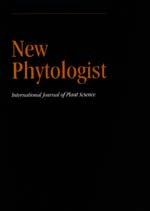Crossref Citations
This article has been cited by the following publications. This list is generated based on data provided by
Crossref.
Frazer, Lilyann Novak
1999.
One stop mycology.
Mycological Research,
Vol. 103,
Issue. 1,
p.
116.
Boucher, Alain
Dalpé, Yolande
and
Charest, Christiane
1999.
Effect of arbuscular mycorrhizal colonization of four species ofglomuson physiological responses of maize.
Journal of Plant Nutrition,
Vol. 22,
Issue. 4-5,
p.
783.
Azcón, R
Ruiz-Lozano, J M
and
Rodríguez, R
2001.
Differential contribution of arbuscular mycorrhizal fungi to plant nitrate uptake (15N) under increasing N supply to the soil.
Canadian Journal of Botany,
Vol. 79,
Issue. 10,
p.
1175.
Thornton, B.
2001.
Uptake of glycine by non‐mycorrhizal Lolium perenne.
Journal of Experimental Botany,
Vol. 52,
Issue. 359,
p.
1315.
Martin, Francis
Cliquet, Jean-Bernard
and
Stewart, George
2001.
Plant Nitrogen.
p.
147.
Ruiz-Lozano, Juan M.
Collados, Carlos
Porcel, Rosa
Azcón, Rosario
and
Barea, JoséM.
2002.
Identification of a cDNA from the Arbuscular Mycorrhizal Fungus Glomus intraradices that is Expressed During Mycorrhizal Symbiosis and Up-Regulated by N Fertilization.
Molecular Plant-Microbe Interactions®,
Vol. 15,
Issue. 4,
p.
360.
Khan, Irshad Ahmad
., Shahbaz Ahmad
and
., Najma Ayub
2003.
Yield and Nutrients Uptake of Avena sativa as Influenced by Vesicular Arbuscular Mycorrhizal (VAM).
Asian Journal of Plant Sciences,
Vol. 2,
Issue. 4,
p.
374.
Pendleton, R. L.
Pendleton, B. K.
Howard, G. L.
and
Warren, S. D.
2003.
Growth and Nutrient Content of Herbaceous Seedlings Associated with Biological Soil Crusts.
Arid Land Research and Management,
Vol. 17,
Issue. 3,
p.
271.
He, Xinhua
Critchley, Christa
Ng, Hock
and
Bledsoe, Caroline
2004.
Reciprocal N (15NH4+ or 15NO3−) transfer between nonN2‐fixing Eucalyptus maculata and N2‐fixing Casuarina cunninghamiana linked by the ectomycorrhizal fungus Pisolithus sp..
New Phytologist,
Vol. 163,
Issue. 3,
p.
629.
Cappellazzo, Gilda
Lanfranco, Luisa
and
Bonfante, Paola
2006.
A limiting source of organic nitrogen induces specific transcriptional responses in the extraradical structures of the endomycorrhizal fungus Glomus intraradices.
Current Genetics,
Vol. 51,
Issue. 1,
p.
59.
Bassirirad, Hormoz
2006.
Root System Characteristics and Control of Nitrogen Uptake.
Journal of Crop Improvement,
Vol. 15,
Issue. 2,
p.
25.
Cappellazzo, Gilda
Lanfranco, Luisa
Fitz, Michael
Wipf, Daniel
and
Bonfante, Paola
2008.
Characterization of an Amino Acid Permease from the Endomycorrhizal Fungus Glomus mosseae
.
Plant Physiology,
Vol. 147,
Issue. 1,
p.
429.
Kuhad, Ramesh Chander
Kothamasi, David Manohar
Tripathi, K. K.
and
Singh, Ajay
2008.
Plant Surface Microbiology.
p.
71.
Anderson, Roger C.
2008.
Growth and Arbuscular Mycorrhizal Fungal Colonization of Two Prairie Grasses Grown in Soil from Restorations of Three Ages.
Restoration Ecology,
Vol. 16,
Issue. 4,
p.
650.
Jiang, Zhongchun
Xu, Chenping
and
Huang, Bingru
2011.
Enzymatic Metabolism of Nitrogen in Leaves and Roots of Creeping Bentgrass under Nitrogen Deficiency Conditions.
Journal of the American Society for Horticultural Science,
Vol. 136,
Issue. 5,
p.
320.
Leigh, Joanne
Fitter, Alastair H.
and
Hodge, Angela
2011.
Growth and symbiotic effectiveness of an arbuscular mycorrhizal fungus in organic matter in competition with soil bacteria.
FEMS Microbiology Ecology,
Vol. 76,
Issue. 3,
p.
428.
Copetta, A.
Bardi, L.
Bertolone, E.
and
Berta, G.
2011.
Fruit production and quality of tomato plants (Solanum lycopersicumL.) are affected by green compost and arbuscular mycorrhizal fungi.
Plant Biosystems - An International Journal Dealing with all Aspects of Plant Biology,
Vol. 145,
Issue. 1,
p.
106.
Audet, Patrick
2012.
Environmental Adaptations and Stress Tolerance of Plants in the Era of Climate Change.
p.
233.
ul Rehman Hakeem, Khalid
Öztürk, Münir
Ahmad, Parvaiz
and
Memon, Abdul Razaque
2012.
Crop Production for Agricultural Improvement.
p.
239.
Mokhele, Bataung
Zhan, Xianjin
Yang, Guozheng
and
Zhang, Xianlong
2012.
Review: Nitrogen assimilation in crop plants and its affecting factors.
Canadian Journal of Plant Science,
Vol. 92,
Issue. 3,
p.
399.


